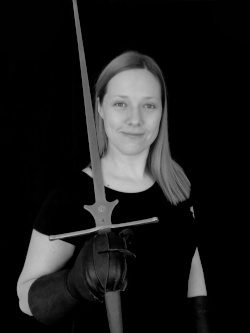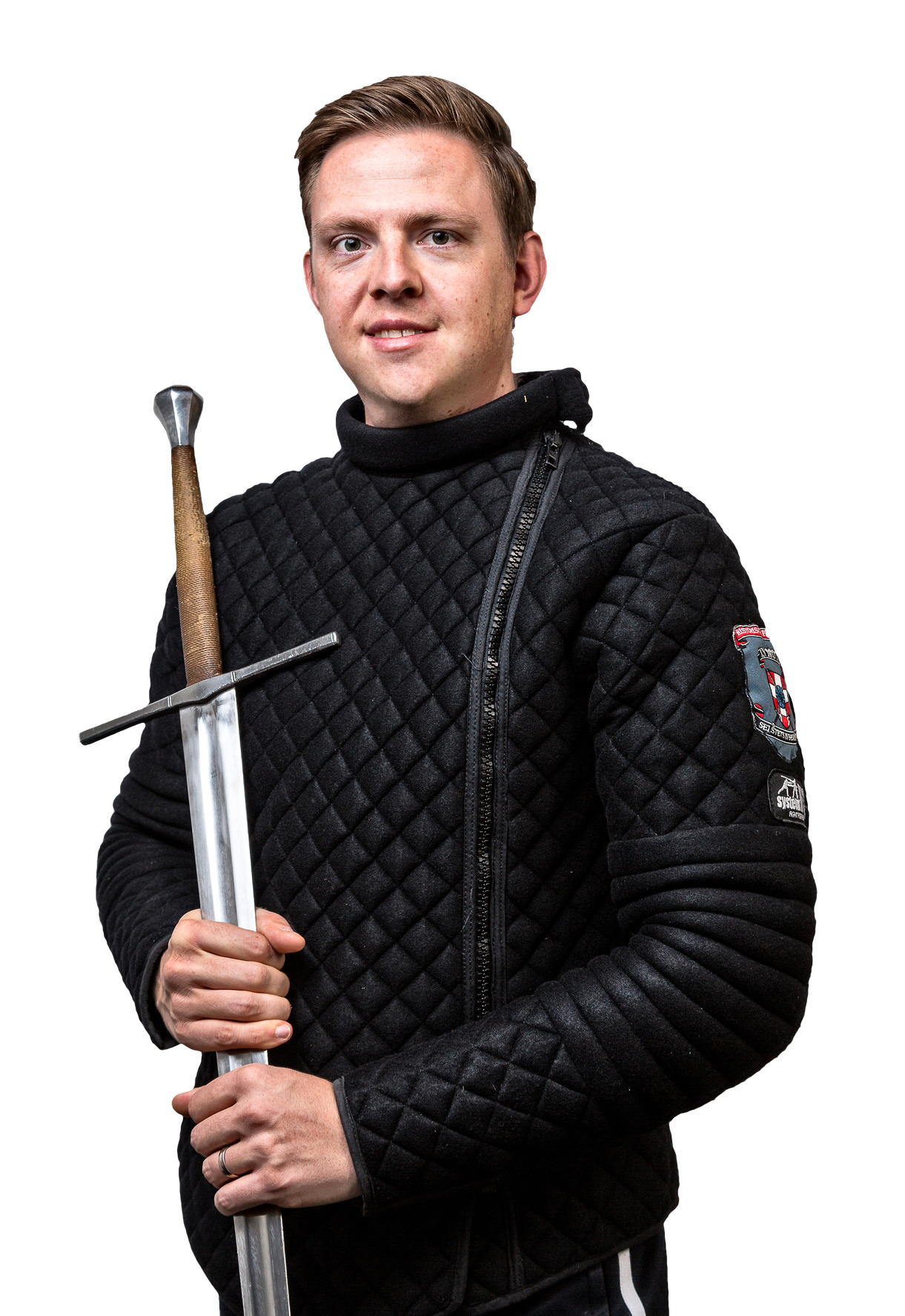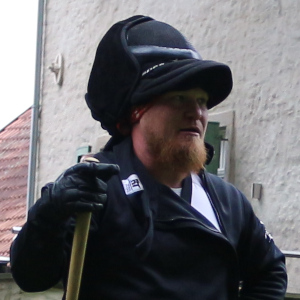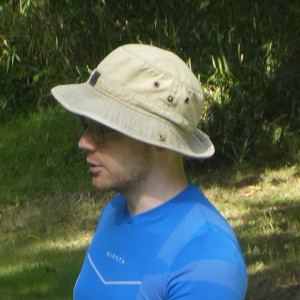Review
Instructors
Wounds and their effects (Lecture)
No further information.

Katja Poppenhaeger became interested in HEMA in 2015 and started studying the longsword at Athena School of Arms near Boston. She moved to Belfast later that year and has been training at Medieval Combat Group Belfast since then, with longsword and messer being her main weapon systems. She became a certified HEMA Ireland instructor for German longsword and messer in 2017.
Flow drills for fun and profit – a longsword and messer workshop (Workshop)
In this workshop Katja will introduce the participants to flow drills as training tools. Flow drills can be used to anchor techniques in the muscle memory, to train making quick decisions, or just to have some fun and get a good workout. In this workshop the focus will be on flow drills for two training partners, starting from very simple drills and continuously adding more complexity by adding more techniques into the drill. Participants will start out with the longsword, and after everyone has mastered the drills and some of the variations, the same drills will be used to train with the messer. Participants should ideally have some experience with the longsword; messer experience is optional. The sources used for the techniques will be Ringeck (for longsword) and Lecküchner (for messer). Katja is a bilingual speaker (German/English), so while the workshop will be held in English, she is available for on-the-spot translations to German.

Joachim Meÿer halbe Stange – “catch him in his own techniques” (Workshop)
This is a very content-rich workshop that goes through the core components of posture, footwork, body and weapon mechanics, as well as some of the techniques that are demonstrated in Joachim Meyer’s fencing treatise of 1570. It tries to build a solid foundation, including dynamic exercises for timing of body and weapon, so that the student can continue exploring this wonderful art with a good understanding of the complexity and broadness of it all.
There are no formal requirements on knowledge, but a fencing mask and a durable 180…210 cm oak or ash staff are required; staffs will be provided in limited numbers. Drinking water must also be brought.

Paul is a historian, military officer and HEMA instructor. He has been fencing since 2001 and since 2016 he has been running his own school “IN MOTU Historical Fencing Arts”. He has been busying himself with the longsword according to German sources of the 14th to 16th century for many years. Since 2013 Paul has also deepened his love for one-handed edged weapons, such as the one-handed sword or the Messer through studies, training and teaching. Working with sources is his daily business at the University or in the Salle.
Zufechten – Entering a Fight (Workshop)
Aimed at: Fencers who are at least training the essentials and have learned about the main strikes and stabbing as well as basic forms of displacements being able to perform them autonomously.
Content: The “Zufechten”, the act of entering a fight marks every fight’s beginning and demands a deep understanding of strategy, tactics, tempo, timing and footwork. In this workshop I want to demonstrate and explicate these factors on the basis of selected exercises and relate them to each other. For this I will point out some basic principles that we find in various sources.
We will cover several training methods, from VENÜ/4-Phase-Method over lessons up to realistic combat exercises for freeplay, making the established didactic way from easy to difficult and from known to unknown.
Required equipment: Weapon simulator of your style (saber, epee, messer, stick, sword, longsword), fencing mask with back-of-the-head protection, gloves.
For increasingly intense exercises (e.g. lessons): Fencing jacket 350 N or above, throat protection.

Lauren is an instructor at the York School of Defence in the UK. Although she now predominantly teaches Messer, her journey into the wonderful world of HEMA started more than a decade ago when she attended a workshop on Victorian self defence, and, after discovering that she could throw a man twice her size clear over her shoulder by just following advice from old newspaper articles, she was hooked. Her interest in the martial and cultural history of that period led her to discover the self defence methods used by the Suffragettes in their fight for the women’s right to vote. She has had the privilege of teaching this fascinating subject to people at events both in the UK and in Europe and is very excited to be able to return to the Tremonia Fechtschule, which was her first international teaching event many years ago.

The Inn-Play: or Cornish Hugg Wrestler (Workshop)
The first true English wrestling manuscript was published in 1727. In this workshop we will explore this fascinating and somewhat eclectic system of unarmed fighting and delve into the various throws, locks, and bizarre ways to torture your opponent.
To take part you will need a spirit of adventure and a big smile. Groin protection is recommended for the gentlemen.

Hengen and Winden – the core of Liechtenauer’s longsword system (Workshop)
Hie merke / das dy winden / ſint dy rechte kunſt / vnd grūtfeſte alles fechtens / des ſŵtes / aus den alle ander gefechte vnd ſtöcke kom̄ē
Nuremberg Hausbuch (MS 3227a), 1389~1494
It is not a coincidence that Zwei Hengen and Winden are the final chapters in the manuscripts that describe fencing with the (long)sword according to Liechtenauer. These chapters are the summary of the principles that are the core of the entire system. All of the Stücken as written before, are only examples of specific situations where these principles are applied in a certain way.
In the workshop we are going to use this approach to fencing. We will find solutions for the problem presented in a given fencing situation, just by winding into the most appropriate Hengen, and combining this with one of the Drei Wunder: Haw, Stich, Schnitt. We will find out if these solutions do indeed lead us to the familiar Stücken as they are described and named in the manuscripts.
Gear requirements: protective gear suitable for controlled drills with cutting and thrusting.
Mandatory: fencing mask. Recommended: back of head protection, throat guard, chest protection (plastic protector or jacket), light gloves, groin protection.
Training weapon: preferably a feder. Nylon or wood longsword simulator or steel blunts are also OK, but are best paired with a similar weapon in drills. When using steel blunts, the recommended protection becomes mandatory (except groin protection).
Programme
| 5:00 pm | Registration, camp setup |
| 6:15 pm | Address of welcome |
| 6:30 pm | Lecture Wounds and their effects (Philipp Markwerth) |
| 8:00 pm | Dinner and Campfire |
| 9:00 am | Breakfast |
| 10:00 am | Morning announcements |
| 10:30 am | Workshop Flow drills for fun and profit – a longsword and messer workshop (Katja Poppenhaeger) Workshop Joachim Meÿer halbe Stange – “catch him in his own techniques” (Roger Norling) |
| 12:30 pm | Lunch |
| 2:00 pm | Workshop Zufechten – Entering a Fight (Paul Becker) Workshop The Inn-Play: or Cornish Hugg Wrestler (Lauren Ireland, Christopher Halpin) |
| 4:00 pm | Fechtschule (tournament) with any synthetic weapon Free training, test cutting |
| 6:00 pm | Barbecue |
| 9:00 am | Breakfast |
| 10:00 am | Morning announcements |
| 10:30 am | Workshop Hengen and Winden – the core of Liechtenauer’s longsword system (Petra Westveer) Workshop Joachim Meÿer halbe Stange – “catch him in his own techniques” (Roger Norling) |
| 12:30 pm | Lunch |
| 1:30 pm | Fechtschule (tournament) with steel longsword Free training |
Testimonials

» Tremonia Fechtschule is one of those events that embody HEMA for me. Events that are very specialised, such as high level tournament, or weapon specific gatherings, are really cool. On the other hand, events that offer the full range of what the historical martial arts have to offer are absolutely great too. Tremonia is fully that: staying in a castle close to Dortmund, following a variety of workshops and lectures, doing tournaments with both longsword and synthetic weapons (you can do some crazy matchups there) and finally sitting down at the camp fire at night. Something that is important for me personally, is that an event has a good balance between activities. There’s few things more annoying than having a full schedule that allows no time for socialising or sparring, and Tremonia Fechtschule thankfully has a good balance in this regard. […] If you’re looking for an event that puts the enjoyment of HEMA first and if you’re looking to see what the German community has to offer, I would definitely recommend going to Tremonia Fechtschule. «

» I must say that im very impressed by Tremonia Fechtschule as an arrangement.
The evenings, which included quite a lot of alcohol and a heavy overweight of men to women in ratio, and I did not see anyone being „that guy“.
Nobody seemed to be have to be moved away, none of the women seemed to be put in awkward situations. […]
The crew behind the event have been actively working with promoting a healthy and inclusive culture for everyone.
Also there were several people who did not drink alcohol and it appeared to me that there was zero peerpresure with regards to alcohol consumption.
In short, if you’re looking for a HEMA event or indeed just a martial art event that is safe, inclusive and friendly regardless of background, culture, skincolor, gender identity or sexuality, I can wholeheartedly recommend Tremonia Fechtschule. «

» I attended Tremonia Fechtschule in 2019; great organisation and atmosphere at the event. The club members were very hospitable and a pleasure to train with! «

» I found the staff to be friendly, polite, and professional. They fostered an atmosphere that was relaxed despite the counter-covid restrictions, but also welcoming and inclusive. […] «

» I really enjoyed my time at the event – […] a wonderful venue, a superb theme and atmosphere, and this naturally seems to attract a lovely group of people. «
